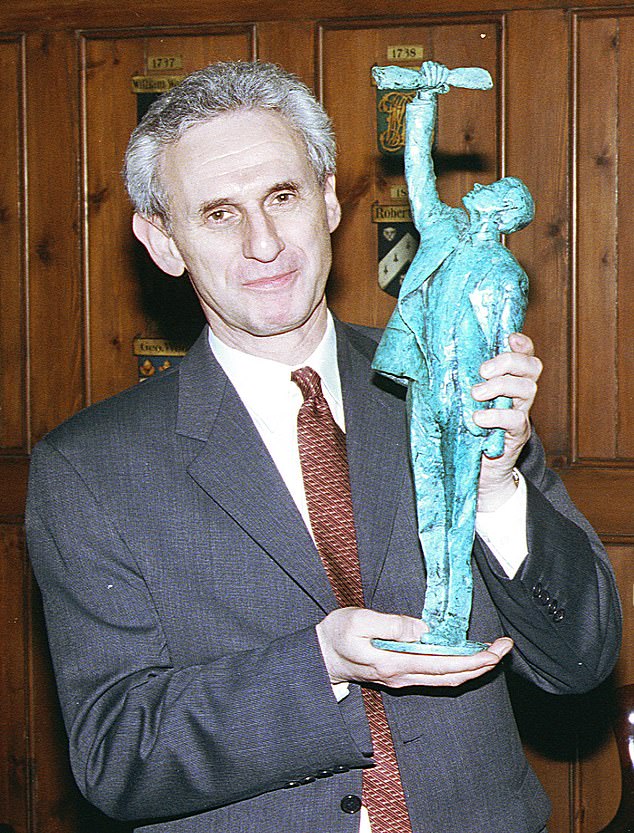ALEX BRUMMER: What you can learn from MY investing mistakes… and even as a financial writer for over 50 years, I’ve made quite a few!
The party ended on a high note when members of my family gathered around our guest artist and sang a stirring version of John Denver’s classic Take Me Home, Country Roads.
Since my oldest son Justin and his wife Ruvani moved to Austin six years ago, country and western music, which abounds at festivals in the Texas Hill Country, has become an important part of our lives.
Every birthday is important, but celebrating my 75th at an Italian wine bar near our home in Richmond, south-west London, felt particularly poignant. Much of the past year was spent dealing with cancer and now I am free. I tried really hard to make sure illness didn’t get in the way of my daily city commentary. But the six months of chemotherapy made me focus on my finances again.
The assumption among readers is that as a financial writer for more than 50 years, everything would be fine.
Alex Brummer, left, in 2007 with one of the leading financial figures of the past half century, Alan Greenspan, head of the US Federal Reserve

Winning the prize for the financial magazine of the year. Alex Brummer writes: I have recaptured my youth with an expensive sports car, can mainly afford business class travel and luxury rental accommodation for summer holidays with the family
But the busier you are, the less time you have to spend on your own financial well-being. Moreover, as a city editor – who provides daily commentary on companies, markets and the economy – I live by an iron rule. If you buy shares or collective investments such as unit trusts, they are intended to be held and not sold.
When my illness was diagnosed, my first reaction was to ensure that the investments were properly managed. Expert advice was sought from a financial advisor of my acquaintance at the London firm Charter Tax. It wasn’t cheap, but the help requested was quick, sensible and valuable.
The rule was that I had to take care of my affairs. The first task was to rewrite my will and that of my wife Tricia to take into account changed family circumstances, namely grandchildren.
Second, maximize the use of transferable inheritance tax by setting up a discretionary trust (an administrative nightmare in itself).
Third, as someone with a full-time job, with an after-tax salary that exceeds expenses, to use some of the surplus from current income to help finance the educational needs of family members. A special form has been obtained from HMRC in which such transfers can be properly recorded.
My last personal action was to draw up what I call a ‘death list’. Having lived through the legacy of family members, parents and a younger brother, I know what a nightmare it is to track down investments, especially in an age of online banking and brokerage.
The idea was to provide my legatees with the distributed account information. This is a task I still haven’t been able to complete. But it’s on a ‘to do’ list.
My circumstances are more complicated than most. Many people dream of retirement, and now that the state pension age has been raised (it will go from 66 to 67 in 2026), it must seem to many a mirage that disappears the closer you get. Ten years past the typical retirement age, I’m still a full-time staff writer on an executive salary.
I am also a pensioner who is entitled to a state pension, accrued over my lifetime and have all the added benefits of older people, including a winter fuel allowance (painstakingly donated to charity), a London travel pass and, fortunately, concessionary entry to museums and matinee performances. These are privileges that are rarely used, as I spend most of my time at my desk.
My state pension, on which I pay the highest income tax, is better than most because I decided to wait until I was 70 to collect it. The accrual rate, the enhanced delay compensation, is remarkably generous.
The latest notice from HMRC, courtesy of the ‘triple lock’ – which offers the best average earnings, consumer prices or 2.5 per cent – saw the weekly payment rise to £285.66. It doesn’t matter that almost half of them are cruelly disappearing in a harsh form of double taxation. Unfunded state pensions are paid from HMRC’s tax and national insurance revenues.
The Tory election promise to add an extra layer to the triple lock, by increasing the tax free allowance so that silver surfers don’t end up in an income trap, has no impact on me as a pensioner. Fortunately, I am not at all dependent on what remains one of the worst state pensions in the Western democracies.
My third income stream is a company pension. My advancing years mean that my Harmsworth pension scheme is part of an old defined benefit scheme. I decided to defer taking my company pension when I turned 65 and continued to benefit from the company’s generous contribution until I reached my late 60s.
But at this point I realized that the actuarial odds were against me and I decided to cash out. I took out the tax-free lump sum of several hundred thousand pounds and kept some in a fund for special rainy day treats. This still left me with a generous monthly allowance, just under half of which disappears into income tax.
I transferred the lump sum amount to a Fund & Share account with platform broker Hargreaves Lansdown. Much to my chagrin, I was among the 300,000 victims who followed HL’s then Wealth List. HL was a devoted admirer of the stock-picking skills of guru Neil Woodford’s now-closed Woodford Equity Income Fund, which collapsed in June 2019. The opportunity cost of the £30,000 invested, the money that could have been built up if I had put the money into a simple tracker fund, would be in the tens of thousands.
If this wasn’t foolish enough, I also subscribed £10,000 to Woodford’s Patient Capital Investment Trust, now run by the blue-blooded Schroders.
My last statement shows an 84 percent loss. Woodford is still wealthy enough to indulge in his show jumping obsessions and has never apologized for robbing him of his hard-earned savings.
Because I am still working, my company pension, like my other income, is subject to income tax.
Because there are no surcharges, the nominal tax rate is approximately 55 percent. My practice is to use the net amount to fund monthly Isa contributions, up to an annual maximum of £20,000 each: all invested in shares and funds.
My financial position as a 75 year old is fantastically favorable with three separate income streams. As someone who spent my previous career as a freelancer burning the midnight oil to independently pay college tuition for three kids and a whopping mortgage, I’ve never had it better. I have recaptured my youth with an expensive sports car, can mainly afford business class travel and luxury rental cars for summer holidays with the family.
These are accessories that I recognize will not be available to most readers. Being cash flow rich and keeping the taxman happy is a lifestyle choice. The ability to express my views on major issues of state during my advancing years is an enormous privilege.
I hope that experience and knowledge of financial and economic history will ensure that the article offers readers value for money and a sound critique of laissez-faire capitalism, in which I deeply believe.
Some links in this article may be affiliate links. If you click on it, we may earn a small commission. That helps us fund This Is Money and keep it free to use. We do not write articles to promote products. We do not allow a commercial relationship to compromise our editorial independence.

